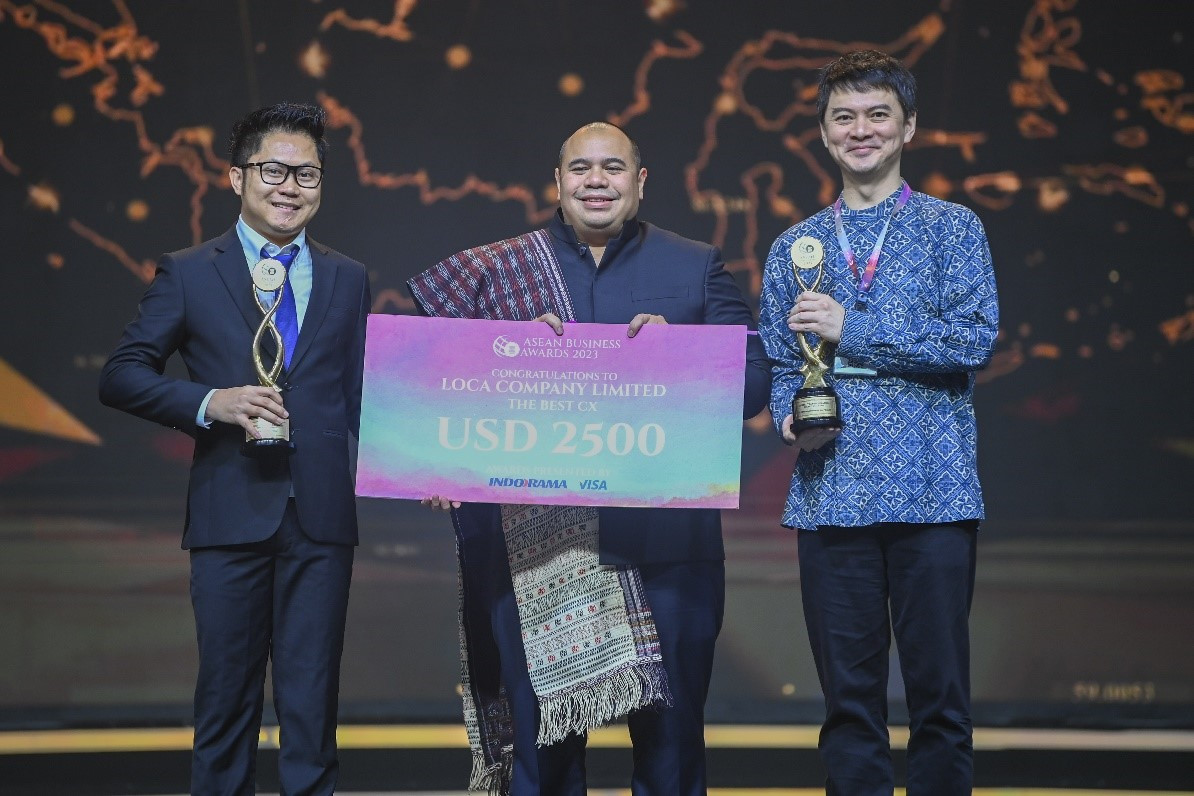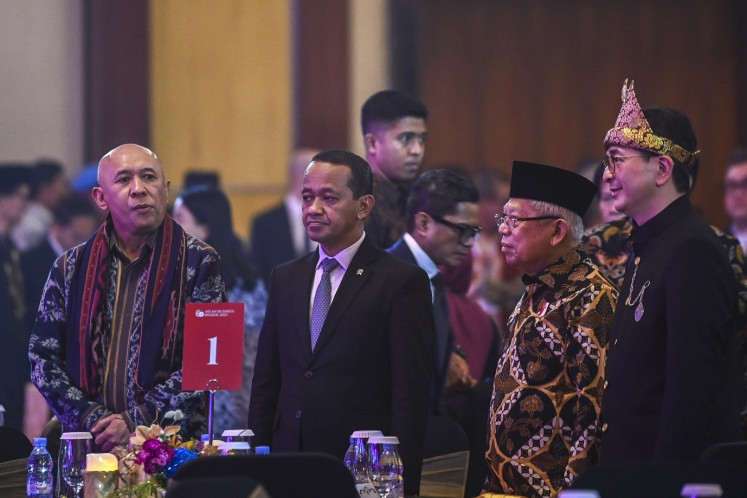Popular Reads
Top Results
Can't find what you're looking for?
View all search resultsPopular Reads
Top Results
Can't find what you're looking for?
View all search resultsGrowth of MSMEs in limelight at ABA event
Change text size
Gift Premium Articles
to Anyone
T
he winners of the ASEAN Business Awards (ABA) have been announced, with micro, small and medium enterprises (MSMEs) once again in the limelight as their growth is seen as a solution to inequality.
At the ceremony Vice President Ma’ruf Amin said ASEAN was home to more than 70 million MSMEs. “More than 90 percent of domestic businesses in ASEAN are in the category of MSMEs. In the region, the MSMEs contribute to creating 85 percent of job opportunities and 44 percent of GDP and 18 percent of national exports,” said Ma’ruf in his keynote address during the ABA presentation ceremony in Jakarta on Monday.
He went on to say that the spread of MSMEs in urban and rural areas had led to MSMES becoming the backbone of inclusive economic growth, part of an effort to reduce inequality. “MSMEs also fuel innovation and creativity in the region,” he added.
According to Ma’ruf, the pesantren (Islamic boarding school) economy in Indonesia has become part of the strategy to develop a national sharia economy in a bid to achieve an inclusive economy. “Their number reaches tens of thousands spread across the country. Pesantren in Indonesia have the potential to be developed optimally in order to improve people’s welfare and reduce inequality,” he said.
“The world is now beset by economic disparity. That’s why, the agenda on economic democratization must become a shared consensus that must be raised by ASEAN political and businesses leaders, that combines the growth and equality in one development package, one of which is through the affirmation of MSMEs,” Ma’ruf Amin remarked.
The ABA presentation ceremony, held by the ASEAN Business Advisory Council (BAC), saw 10 MSMEs from ASEAN garner awards in a variety of categories.
Aboitiz Data Innovation from the Philippines won the Digital Transformation Award; LOCA Company Limited from Laos won the Best CX Award; Agrab ah Ventures from the Philippines won the Net-Zero Leader Award; PT Amandina Bumi Nusantara from Indonesia won the Plastic Waste Circularity Award; Cambodian Standard Development & Supply Co., Ltd from Cambodia won the Sustainable Crop Production Award; Eden Agritech from Thailand won the Tech for Sustainable Agriculture Award; Speco from Singapore won the Health Innovation Award; the Philippines’ Orange and Bronze Software Labs, Inc. won the Health Achievement Award; Myanmar’s Bella Interiors Company Limited won the Export Growth Award; and Bintang Capital Partners from Malaysia won the Innovative Investment Award.
Greater attention to MSMEs in the BAC Summit started earlier when the ASEAN Weekend Market was held. The Sept. 1-3 event presented 45 MSMEs from Cambodia, Myanmar, Thailand, Singapore, Malaysia, the Philippines and Indonesia.
According to the chairperson of the ASEAN-BAC 2023 who is also the chairperson of the Indonesian Chamber of Commerce and Industry Arsjad Rasjid, the participation of the MSMEs in the ASEAN Weekend Market showed how vital local creativity and innovation are in creating job opportunities, raising income and strengthening regional economic fundamentals.
Souliyo Vongdala, cofounder and CEO of Loca Company Limited, the Laos-based ride-hailing service application, which won the Best CX Award, highlighted the advantages that digitalization and electric vehicles (EVs) offered.
“Digitalization provides job opportunities for many people, including drivers. But with the electric cars that we use, passengers as consumers can enjoy affordable prices because the gasoline price is very high in Laos,” he said in an interview upon receiving the award.
According to Souliyo, the tourist sector contributes more than 55 percent of GDP in Laos so offering convenient and affordable transportation services for tourists or visitors is of paramount importance.
“We build the ecosystem on mobility and transportation, EV infrastructure and finance the drivers that want to shift from gasoline-fueled cars to electric cars,” he said.
In the context of ASEAN’s economic integration vision, he said that his company was building a network that connected ASEAN countries and also other regions. “We help people to make seamless payments irrespective of where they are.”
He noted that the award was a symbol of the hard work that “we have been consistently carrying out for the past four or five years. And also, our drivers’ commitment to providing the best service.”
Collaboration within ASEAN countries is important as this will allow for the sharing of technology and knowhow. “Looking ahead, we plan to develop a new financial service that supports sustainable and green energy,” he remarked.
Several large corporations also shared their best practices and innovation on the sidelines of the ABA presentation ceremony. PT Chandra Asri Petrochemical, which won the Plastic Waste Circularity Award, was one of these.
“Our innovation is how we treat plastic waste and convert it into useful items by using end-to-end waste management, the source of which comes from seashores and the community, including fishermen,” PT Chandra Asri Petrochemical’s legal, external affairs and circular economy director Edi Rivai said.
“We treat plastic waste collectively through our integrated waste treatment industry. We sort out the waste and convert the valuable plastic waste into recycled products. Plastic bags, which many regard as being problematic, are utilized as a basic material for additives in asphalt roads. To date a total of 600 tonnes of plastic waste has been used as an additive in asphalt roads,” he said.
He went on to say that plastic waste with a low value, such as sachets and other plastic waste in small sizes were treated and converted into fuel oil, petrol, diesel oil and kerosene.
“We return the products that we produce to the community, including fishermen that collect the waste from the coastline and the sea. They utilize the fuel oil for their boats or cooking as an alternative to LPG,” he said.
The diesel oil is commonly used as fuel for office vehicles and other vehicles owned by the community, which can bring about a remarkable economic impact, according to Edi.
“Another positive impact, which is also a blessing, the innovation allows the fishermen to own a sampah [waste] bank, which can prevent local people from dumping their plastic waste into rivers, which ends up to the sea. This way, the waste issue in the sea can be resolved,” he said.
“We hope that our model can be replicated by other regions or governments so as to solve the problems of waste on the land, in rivers and the sea, especially in remote islands, and in other sites,” he said.











